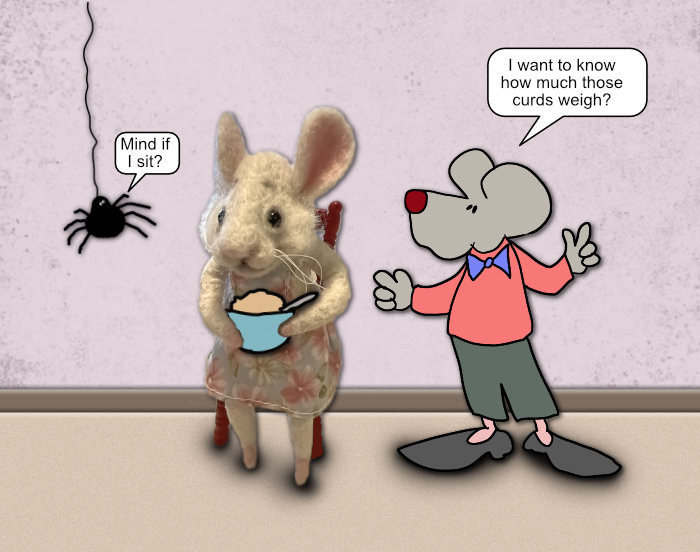I don’t mind spiders.
So long as they don’t sneak up on me. Like. On me.
But even still, in most cases, I just usher them outside, and send them on their merry way.
That wasn’t the case with Miss Muffet.
Oh. Those old nursery rhymes sure can be colorful. Muffet Girl is no different.
The first written version of “Little Miss Muffet” nursery rhyme dates back to the early 19th century England.
And it was first printed in the “Songs for the Nursery” collection published in 1805.
But what is a muffet, exactly? And until I looked it up, I thought my tuffet was my tush. My bootie. My hind quarters. But a tuffet is really a footstool. Or a low seat.
The origin of “Little Miss Muffet” is most commonly attributed to Dr. Thomas Muffet. He was a notorious physician and entomologist during the 1500s. He authored a renowned scientific illustrated guide about insects.
“Little Miss Muffet” is about a girl named Patience, who was Dr. Muffet’s stepdaughter. The “probable” background suggests the story in the Muffet household. It happened when Patience ran away from her breakfast after being frightened by a spider from Dr. Muffet’s collection. But the origins of this are based on speculation and have never been proven.
Here is the full version.
Whoever wrote it went wonky at the end of the second verse, when her shoes fall off and don’t rhyme with a thing.
Little Miss Muffet
Sat on a tuffet,
Eating her curds and whey;
Along came a spider,
Who sat down beside her
And frightened Miss Muffet away
Little Miss Muffet,
Sat on a Tuffet,
Eating her Bread and Jam,
Along came a Spider,
While she was Drinking her Cider,
And she ran away and her shoes fell off!
So there it is.
For those of you who fear spiders, know that you have a friend in Miss Patience Muffet.
And it might be a good reminder that we should be patient with spiders and all insects. Even though a lot of times they look creepy and weird. But so do some of us. So there is that too.
πππππππ
Nature will bear the closest inspection. She invites us to lay our eye level with her smallest leaf, and take an insect view of its plain.
– Henry David Thoreau
πππππππ
Everything has beauty, but not everyone sees it.
– Confucius
ππππππππ
Beauty in things exists in the mind which contemplates them.
– David Hume
ππππππππ
Tuffet spiders and losing your shoes
